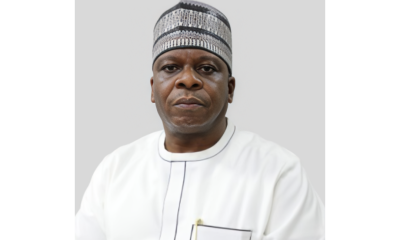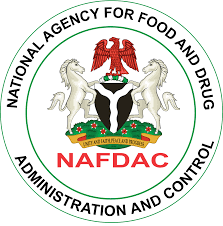Health
NAFDAC Prohibits Promotion, Sales of Breastmilk Substitute in Health Facilities

The National Agency for Food and Drug Administration and Control (NAFDAC) says it has prohibited the promotion and sales of Breastmilk Substitute (BMS) in health facilities.
Mrs Rahila Maishanu, BMS Desk Officer, NAFDAC, Kaduna Office stated this in Zaria, at a one-day training of health workers on the BMS Code and its compliance.
The Training was organised by the state Primary Health Care Board in collaboration with NAFDAC and supported by a global nutrition initiative, Alive & Thrive, under its Maternal, Infant and Young Child Nutrition programme.
Maishanu said that the prohibition was in line with the International Code for Marketing of BMS adopted by the World Health Assembly in 1981 to promote protect and support optimal breastfeeding practices.
She described breastfeeding as a “high impact, low technology, cost effective” intervention for child survival and optimal cognitive development and sustainability.
She said however, that sadly that the practice was still very low with a national average for early initiation of breastfeeding at 23 per cent, while Kaduna state was at 13 per cent.
She added that the national average for exclusive breastfeeding stood at 34.4 per cent with Kaduna State a little bit higher at 41 per cent.
She attributed part of the problem to the aggressive marketing and promotion of BMS among mothers in communities including health facilities.
The desk officer said that the BMS Code and National Regulation among other things, prohibited the promotion of BMS and related products, including the distribution of free or low-cost supplies in health facilities.
“It also prohibits the advertisement of BMS and related products such as feeding bottles, cereals, teats, pacifiers, breast bump, juice, and baby teas among others to the public or at health facilities.
“The Code equally prohibits the provision of samples of any milk or infant formula marketed for feeding infants and young children and related products to pregnant women, new mothers, or their families.
“There shall be no company sales representatives to advise mothers or provide gifts or personal samples to health workers.
“No healthcare facility shall allow manufacturers or distributors of the BMS to use their facilities for commercial events, contests, or campaigns among other prohibitions,” she said.
She said that NAFDAC was empowered by law to implement, monitor, and enforce the provision of the International Code of Marketing BMS, under the provisions of the NAFDAC Act Cap N1 LFN 2004.
She said that the BMS Code served as a weapon to protect breastfeeding from the negative impact of aggressive advertising and marketing techniques by infant food manufacturers on breastfeeding practices.
Maishanu said that the Code was developed as a global public health strategy to protect breastfeeding mothers from the aggressive marketing of baby foods and ensure safe feeding and better nutrition for babies.
“The implementation and enforcement of the Code is aimed at protecting, promoting, and supporting breastfeeding, by ensuring appropriate marketing and distribution of BMS.
“The aim is to contribute to the provision of safe and adequate nutrition for infants, by the protection and promotion of optimal Infant and Young Child Feeding (IYCF) for child survival, growth, and development.
“It was also to protect breastfeeding from the inappropriate marketing practices of Infant food manufacturers and distributors and to build the confidence of mothers to adopt best IYCF practices.
“It also ensures the proper use of breastmilk substitutes, when necessary, by providing adequate information and through appropriate marketing and distribution,” she said.
She stressed the need for the health workers to arm themselves with knowledge about the code and the national regulation to be able to do what was best for the children. (NAN)
Health
We want Nigeria Where No Child Is Exploited, Excluded – Children’s Parliament

National Children’s Parliament has urged stakeholders to build a Nigeria where no child faces violence, forced labour or exclusion.
The Speaker of the parliament, Progress Umoh, made the call at the 2025 National Children’s Day in Abuja on Tuesday.
Umoh said that children craved for a country where every child has the tool to learn, dream and grow to full potential.
She pointed out that many children face violence, fear and exclusion in spaces meant to nurture them, adding that children demand more than promises.
“We demand protection. As Nelson Mandela said — a society’s soul is measured by how it treats its children.
“Let us honour that truth with action.
“As the speaker of the National Children’s Parliament, I stand before you not just as a young Nigerian but as a voice for millions of children whose rights and future depend on meaningful action.”
She said that the Children’s Parliament serves as vital platform where young voices unite to address critical issues, propose solutions and drive change.
According to her, children deserve a seat at the table in shaping policies that affect them.
She noted that the theme of the global observance — “Stand Up, Speak Up: Building a Bullying-Free Generation”, is an urgent call to action.
She, therefore, called for full implementation of the National Policy on Safe Schools to ensure every child learns in a safe environment without fear.
The speaker also stressed the need to strengthen child rights advocacy clubs in rural and underserved areas.
This, according to her, will empower young leaders to speak up.
She explained that “while initiatives like the National Commission for Almajiri Education are commendable, we need bolder steps to rescue out-of-school children, providing them education, safety and skills for the future.
“Programmes like the Girl-Led Movement proves that when children lead, change happens, such
initiatives must include all children, ensuring their voices shape decisions about their lives.”
Responding, President Bola Tinubu reaffirmed his administration’s commitment to protecting the rights, dreams and future of every Nigerian child.
Represented by the Minister of the Federal Capital Territory, Mr Nyesom Wike, the president described children as “the precious part of the nation’s fabric.”
Wike was also represented at the event by the FCT Minister of State, Dr Mariya Mahmoud.
Tinubu added that children are also the heartbeat of Nigeria’s future and custodians of tomorrow’s promise, innovation and leadership.
He said “I, therefore, reaffirm today, our constitutional, moral and intergenerational duty and commitment to safeguard every Nigerian child, protect their rights and nurture their dreams.”
Similarly, the Minister of Women Affairs, Imaan Sulaiman-Ibrahim, said children’s day serves as an opportunity to reaffirm commitment to uphold the rights of every child to survive, thrive and fulfil their potential.
Sulaiman-Ibrahim added that the day also presents an opportunity to reflect and renew commitment to the rights, protection and wellbeing of every Nigerian child.
She said the Federal Government would strengthen the Nigeria Children’s Parliament to institutionalise child participation in governance.
“We are also developing the institutional framework for a National Child Protection and Development Agency.
“This strategic action aligned with the ministry’s Five-Year Strategic Roadmap to ensure accountability, coordination and sustainability in child welfare programming.”
On her part, Dr Adedayo Benjamins-Laniyi, the Pioneer Mandate Secretary, FCT Women Affairs, said “we are here to recognise the significance of our children in the family circle and the society at large.
“Importantly, we are here to stress the obvious fact that our children are great asset to us, they represent our hope, our continuity, our vision and most importantly, the future of our dear country, Nigeria.
“Today, as we gather to celebrate our children, we call on our teeming students in FCT to rise against bullying and speak up whenever confronted with this radical menace.
“I urge you to avoid bullying and channel all your energy to academic resourcefulness to shape a better tomorrow for yourselves,”(NAN)
Health
Menstrual Health Day: AHF Nigeria Wants Joint Action to End Period Poverty

The AIDS Healthcare Foundation (AHF) Nigeria, has called for joint actions to ending period poverty in Nigeria with consistent investment in initiatives that bridged the knowledge gap of menstrual health management.
The AHF Nigeria Country Programme Director, Dr. Echey Ijezie, made the call on Monday in a statement in Lokoja.
The Menstrual Health Day is observed annually on May 28.
The 2025 Menstrual Health Day has as its theme ”Let’s Fight Period Poverty and End the Stigma”.
Ijezie said that research showed that nearly 2 billion people menstruate globally, with 500 million experiencing period poverty, including the lack of access to menstrual health products, safe and clean facilities, and accepting communities.
“We are calling on government to invest in providing free sanitary pads to young girls, across Nigeria, especially indigent girls who lack access to sanitary pads,” he said.
He emphasised the need for collective actions to address the stigma, cultural taboos, and lack of menstrual hygiene access that undermine dignity and increase HIV risk among women and girls.
He said that as part of activities to commemorate the World Menstrual Health Day 2025, the AHF Nigeria would carry out a commemorative event at WAPI Secondary School Calabar, Cross River as well as in the Karinmajigi community in Abuja.
The country pragramme director noted that women and girls globally, particularly in regions like sub-Saharan Africa, were faced with a disproportionate HIV burden.
He stressed that lack of access to sanitary pads had forced many to miss school, thereby increasing the likelihood of dropping out.
This, he said often resulted to increased transactional or transgenerational sex, limiting their ability to negotiate safer sex thereby raising the risk of contracting HIV.
He explained that the AHF’s menstrual health day worldwide commemorations were part of broader strategic prevention efforts that highlight the link between menstrual health and HIV.
He added that it would promote the availability and accessibility of menstrual products, and integrate sexual and reproductive health information and services.
According to him, it will ensure that women, girls, and people who menstruate have access to sanitary pads, HIV testing, condoms, and essential care.
He disclosed that the AHF Nigeria would empower young women and girls, both in-school and out-of-school with the information and knowledge they require for a safe menstrual experience.
“Importantly, we shall provide free sanitary pads, both disposable and reusable to young girls in Calabar, Abuja and Makurdi.
“AHF is committed to ending period poverty in Nigeria with consistent investment in initiatives that bridges the knowledge gap of menstrual health management.
“We will bridge the knowledge gap in young women and girls and in combating the myths, stigma and cultural taboos undermining the wellbeing of young women and girls.
“To this end, we will continue to expand access to accurate information and the provision of free sanitary pads to compliment the efforts of other concerned stakeholders,” Ijezie said.
He noted that barriers, along with stigma, could lead to poor health outcomes, missing school or work, and adverse effects on mental health.
NAN reports that AHF, the largest global AIDS organisation, currently provides medical care and services to more than 2.2 million people in 48 countries worldwide. (NAN)
Health
Children’s Day: Prioritize Girl-Child’s Needs — NGO

A non-governmental organisation — Mothers And Marginalized Advocacy Centre (MAMA) — has urged governments, civil society groups, and the public to unite in prioritizing the needs of children, especially the girl-child.
The Executive Director of the organisation, Ms Chioma Kanu, made the call in a statement on Sunday ahead of the International Children’s Day on May 27.
Kanu said that a country, such as Nigeria, where every girl could grow up safe, educated, and free from exploitation could be achievable through collective action.
She said that the organisation was founded and led by survivors of domestic violence, including women and girls.
She said, therefore, the survivors were raising a powerful voice to highlight the critical and often overlooked needs of girls and vulnerable groups across Nigeria.
“Drawing upon lived experiences, we urge increased awareness, targeted interventions, and stronger protective measures to safeguard this vulnerable population, ” Kanu said.
According to her, Nigeria continues to grapple with complex socio-economic challenges that disproportionately impact girls and women.
This, she said, left them at heightened risk of exploitation, violence, and trafficking.
“As survivors, we understand the insidious ways in which vulnerability can be exploited.
“International Children’s Day should be a time of celebration and hope, but for countless girls in Nigeria, it is a reminder of the dangers they face daily.
“We cannot stand idly by while their futures are stolen, “ Kanu said.
The founder also called for attention to several key areas requiring urgent action such as education and empowerment programmes.
Kanu said: “We believe that ensuring access to quality education for all girls is paramount in preventing exploitation.
“Empowering women through skills development and economic opportunities reduces their vulnerability to traffickers and abusive situations.
“We advocate for increased investment in girls’ education, scholarships for marginalised communities, and programmes that promote financial independence for women.”
The founder also called for an end to Gender-Based Violence in Nigeria.
According to her, the prevalence of gender-based violence, including sexual assault and harmful traditional practices, creates a climate of fear and insecurity that traffickers exploit.
“MAMA Centre therefore calls for the strict enforcement of laws protecting women and girls, the provision of comprehensive support services for survivors of violence, and community-based initiatives that challenge harmful norms,” she said.(NAN)


























